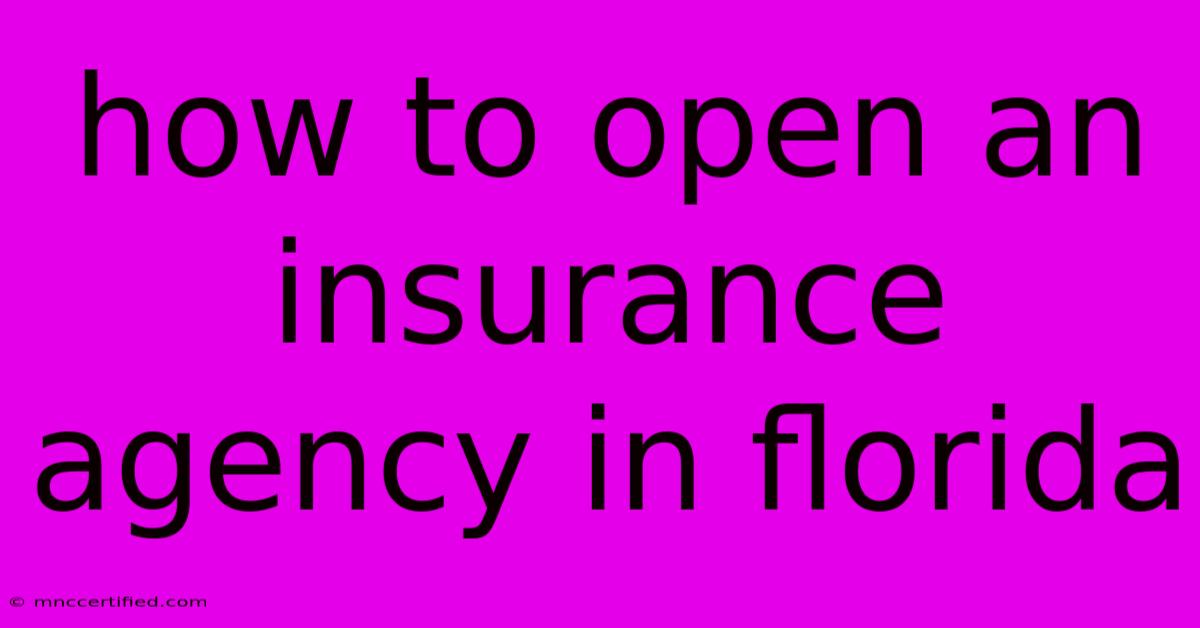How To Open An Insurance Agency In Florida

Table of Contents
How to Open an Insurance Agency in Florida: A Step-by-Step Guide
Starting an insurance agency in Florida can be a lucrative venture, but it requires careful planning and execution. From licensing requirements to marketing strategies, this guide provides a comprehensive overview of the process.
1. Determine Your Niche
Before diving into the specifics, it's crucial to determine your niche. What type of insurance will your agency specialize in? Some popular options include:
- Property and Casualty Insurance: Covers damage to property and liability for accidents.
- Life Insurance: Provides financial protection for beneficiaries in case of death.
- Health Insurance: Offers coverage for medical expenses.
- Commercial Insurance: Protects businesses from various risks.
Choosing a niche allows you to focus your marketing efforts and build expertise in a specific area.
2. Obtain the Necessary Licenses and Permits
Florida requires specific licenses and permits to operate an insurance agency.
- Insurance Producer License: This license allows you to sell and service insurance policies.
- Agency License: Required for the agency itself to operate legally in Florida.
- Business License: Necessary to operate any business in Florida.
- Other Permits: Depending on your location and specific niche, you may need additional permits, such as a fire safety inspection or a zoning permit.
You can obtain the necessary information and applications from the Florida Department of Financial Services.
3. Develop a Business Plan
A well-written business plan is crucial for securing funding, attracting investors, and outlining your strategy for success.
Your business plan should include:
- Executive Summary: Briefly outlines your business idea, target market, and key goals.
- Company Description: Details your agency's mission, vision, and unique selling proposition.
- Market Analysis: Research your target market, competitors, and industry trends.
- Products and Services: Clearly define the insurance products and services you will offer.
- Marketing and Sales Strategy: Outline your approach to attract and retain customers.
- Financial Projections: Include revenue projections, expenses, and profitability analysis.
4. Secure Funding
Starting an insurance agency requires capital for operational expenses, licensing fees, and marketing initiatives. Consider the following funding options:
- Personal Savings: Utilize your own funds for initial investment.
- Bank Loans: Explore loan options offered by banks specifically designed for small businesses.
- Investors: Seek funding from angel investors or venture capitalists.
- Grants: Research government grants or programs that support new businesses.
5. Find a Suitable Location
The location of your insurance agency is crucial for visibility and accessibility. Consider these factors:
- Foot Traffic: If you plan to have a physical office, choose a location with high foot traffic.
- Parking Availability: Ensure easy parking access for clients.
- Visibility: Choose a location with prominent signage and easy visibility.
- Target Market: Select a location that aligns with your target market demographics.
6. Choose Software and Technology
Investing in the right software and technology is essential for efficient operations and customer service.
Consider these tools:
- Agency Management System (AMS): Automates tasks like policy management, client communication, and reporting.
- Customer Relationship Management (CRM): Tracks client interactions and manages customer data.
- Online Quoting and Application System: Allows clients to obtain quotes and apply for insurance online.
- Payment Processing Software: Simplifies payment collection and processing.
7. Develop a Marketing Plan
A strong marketing strategy is essential to attract and retain customers.
Here are some effective approaches:
- Website: Build a professional website with clear information about your agency, services, and contact details.
- Social Media: Engage with potential clients through social media platforms like Facebook, LinkedIn, and Instagram.
- Networking: Join industry associations and participate in events to build relationships with potential clients and partners.
- Referral Programs: Encourage existing clients to refer new customers through attractive incentives.
- Community Involvement: Sponsor local events or charities to enhance brand awareness and build trust.
8. Build Strong Relationships with Insurance Carriers
Partnering with reputable insurance carriers is crucial for success.
- Negotiate Competitive Rates: Secure competitive rates for your clients.
- Secure a Wide Range of Products: Offer a diverse portfolio of insurance products to meet various needs.
- Maintain Strong Communication: Foster strong communication and collaboration with carriers for smooth operations.
9. Provide Excellent Customer Service
Exceptional customer service is paramount for building a successful insurance agency.
- Be Responsive: Respond promptly to inquiries and address client concerns effectively.
- Offer Personalized Solutions: Understand client needs and provide tailored insurance solutions.
- Follow Up Regularly: Stay in touch with clients after policy issuance to ensure satisfaction.
- Build Trust: Establish strong relationships based on transparency, integrity, and expertise.
Conclusion
Opening an insurance agency in Florida involves a combination of planning, execution, and dedication. By following these steps, you can increase your chances of building a successful and profitable business in this competitive industry. Remember to prioritize customer service, leverage technology, and continuously adapt to evolving market trends to thrive in the long run.

Thank you for visiting our website wich cover about How To Open An Insurance Agency In Florida. We hope the information provided has been useful to you. Feel free to contact us if you have any questions or need further assistance. See you next time and dont miss to bookmark.
Featured Posts
-
Golden State Mutual Life Insurance Company
Nov 07, 2024
-
S And P 500 Lags As Airline Stocks Rise In October
Nov 07, 2024
-
Bidens Presidency Trumps Second Term
Nov 07, 2024
-
National Guardian Long Term Care Insurance
Nov 07, 2024
-
Homeowners Insurance For Unmarried Couples
Nov 07, 2024